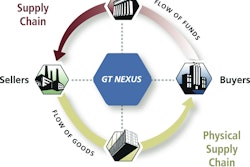Oakland, Calif.—Oct. 8, 2014—GT Nexus announced that Topson Downs selected the GT Nexus platform to standardize supply chain workflows, improve visibility and support rapid growth. Automated processes for purchase orders, invoices, settlements, ASNs, packing and scanning, and work-in-process (WIP) tracking will enable Topson Downs to handle heavier order volumes, including smaller and more frequent orders to support omnichannel, without adding staff or resources.
Topson Downs is a fast-growing company in the apparel and manufacturing industry. Over the last 38 years, it built a roster of independent fashion brands and private-label collections that sell to major retailers internationally, such as Macy's, Nordstrom, Bloomingdale's, Target, Walmart and Kohl's.
“A major part of our growth strategy is based on having scalability to meet the increasing demands of our retail customers, including inventory optimization, tighter collaboration with suppliers and improved communication to customers,” said Kelly Gordon, COO of Topson Downs. “The ability to automate processes from supplier purchase order through settlement, including factory floor packing, scanning and WIP tracking, enables us to manage processes by exception, improve accuracy levels and significantly reduce chargebacks, and provide better service levels for customers. This means our staff is freed up to spend more time on strategic growth initiatives. Visibility through GT Nexus will also empower our suppliers with direct visibility into the latest orders, amendments and payment statuses.”
Placing its supply network in the cloud provides Topson Downs with a collaborative infrastructure to increase direct sourcing. The agility of a cloud platform will also help streamline integration processes following Topson Downs’s recent acquisition of the Rachel Roy brand, which plays a key role in its exclusive relationship with Macy’s.
“Topson Downs is a fast-growing company with plans to keep its foot on the accelerator,” said Sean Feeney, CEO of GT Nexus. “It recognized that traditional enterprise systems didn’t provide sufficient interaction with suppliers to support its fast-paced business needs. Moving its supply chain to the cloud breaks down many of the barriers that prevent apparel brands and retailers from supporting omnichannel retail.”

















